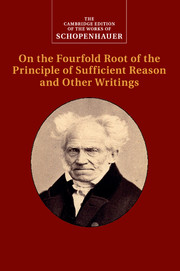Book contents
- Frontmatter
- Contents
- General Editor’s Preface
- Editorial Notes and References
- Introduction
- Notes on Text and Translation
- Chronology
- Bibliography
- Collation of the Two Editions of On the Fourfold Root
- 1 On the Fourfold Root of the Principle of Sufficient Reason
- 2 On Vision and Colours
- 3 On Will in Nature
- Glossary of Names
- Index
Preface
Published online by Cambridge University Press: 30 June 2022
- Frontmatter
- Contents
- General Editor’s Preface
- Editorial Notes and References
- Introduction
- Notes on Text and Translation
- Chronology
- Bibliography
- Collation of the Two Editions of On the Fourfold Root
- 1 On the Fourfold Root of the Principle of Sufficient Reason
- 2 On Vision and Colours
- 3 On Will in Nature
- Glossary of Names
- Index
Summary
I have had the pleasure of being able to lay an improving hand on this small work – after nineteen years, and the pleasure has been all the greater since this work is of special importance to my philosophy. For proceeding from the purely empirical, from the observations of unprejudiced scientists who follow the path of their particular science, I immediately arrive here at the core of my metaphysics, indicating the points of contact of this metaphysics with the natural sciences, and thus providing, as it were, an arithmetic proofa of my fundamental dogma, which in this way is grounded more specifically and in more detail, just as it is understood more clearly, more comprehensibly, and more precisely than anywhere else.
The improvements given in this new edition are almost all additions, since almost nothing worthmentioning has been left out of the first edition; in contrast, numerous and in some instances important additions have been inserted.
But even in a general sense it is a good sign that the book trade has demanded a new edition of this work, since it indicates general interest in serious philosophy and confirms that the need for actual progress in philosophy is becoming felt more pressingly than ever at present. But this is based on two circumstances. It is based first on the unparalleled, zealous undertaking of all the branches of the natural sciences, which, being for the most part handled by people who have learned nothing else, threatens to lead to a crass and stupid materialism of which the primary offence is not the moral bestiality of the ultimate results, but the incredible ignorance of first principles, since even the life force is denied and organic nature is degraded to a chance play of chemical forces., Such men of the crucible and retort must be taught that mere chemistry qualifies one as an apothecary, but not as a philosopher, and no less must certain other scientists of like mind be taught that one can be a consummate zoologist and be able to rattle off all sixty species of monkeys, and yet, if one has learned nothing more than, perhaps, his catechism, taken on the whole he is an ignoramus, to be counted among the rabble. But nowadays this is frequently the case.
Information
- Type
- Chapter
- Information
- Schopenhauer: On the Fourfold Root of the Principle of Sufficient Reason and Other Writings , pp. 305 - 320Publisher: Cambridge University PressPrint publication year: 2012
